Публикации
Abstract: Монографията си поставя предизвикателната задача да осветли механизмите на макросоциалната трансформация чрез комплексен изследователски дизайн (социокултурен и антропологичен). Текстът е структуриран в три логически взаимосвързани глави, които целят да изградят иновативна интегративна теория на социалното развитие. Въведен е нов „културантропологичен“ метод като алтернативен подход за изследване на промените в обществото. Този метод съчетава микроравнището (индивидуална човешка дейност), мезоравнището (култура или общностно съществуване) и макроравнището (социетални промени) в един интегриран теоретичен модел. Този подход позволява по-цялостно разбиране на социалните промени, тъй като взема предвид връзките и взаимодействията между различните равнища на обществото. Сред безспорните достойнства на разработката са извличането и синтезът на нови знания за механизмите на социалните промени в съвременните общества чрез критически анализ на преобладаващите научни изследвания и конструиране на евристични алтернативни модели, които да запълнят изследователския вакуум.
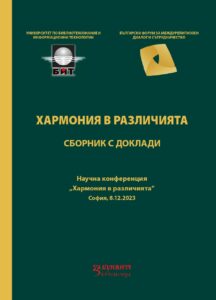
Abstract: In the period January – February 2022, an empirical study was conducted among 396 Bulgarian respondents through an online questionnaire to analyse attitudes towards some bioethical issues such as abortion, in vitro fertilization, surrogacy, and euthanasia. The results show the existence of a relative consensus
regarding issues affecting the legalization of abortion and in vitro procedures and some hesitancy regarding the legal regulation and public acceptance of surrogacy and euthanasia. In general, it can be said that these problems would find a constructive solution if synchronization between the individual will and personal choice and the public interest in the modern information society takes place. The complex bioethical problem, which includes questions related to medicine and pharmacy, technology, ethics, law, religion, public attitudes, and values, etc. defines future deepening of the analysis and research methodology.
Keywords: bioethical issues, attitudes, empirical study, Bulgarian society
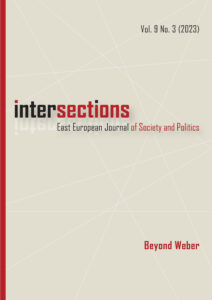
Abstract: The article is devoted to the relationship between religiosity and social action. It studies religious communities in Bulgaria as active subjects of social change in the period of transition from a totalitarian to a democratic society in the 1980s and 1990s. The subjects of the study are Orthodox charismatic communities, established formally as political formations in the mid 1980s but by the mid 1990s gradually transforming into religious ones. The article is based on the Weberian social action theory and value-spheres typology. Using historical and sociological approaches an analysis of documents and of semi-standardized interviews is done.
Keywords: Max Weber, social action, social change, charisma, value spheres, Bulgaria, transition.

Abstract: This article examines public attitudes towards communist monuments as part of the contentious heritage of totalitarianism in post-communist Bulgaria from the 1990s to the present. Its main goals are, first, to analyse the place of political monuments as political subjects of social change during the Bulgarian transition from a totalitarian to a democratic society; second, to study the monuments as ‘realms of memory’ within the changes of collective memory in the post-communist period. The research combines the approaches of political (social) anthropology, cultural anthropology and historical geography. Exploring political subcultures, it investigates ex-communist and anti-communist activities regarding the future of totalitarian monuments. The research is focused on two urban landmarks in Sofia: the Mausoleum of the communist leader Georgi Dimitrov, and the Monument to the Soviet Army.
Keywords: Bulgaria; communist heritage; monuments; subcultures; transition period
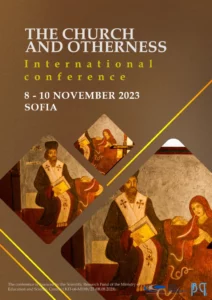
Abstract: The paper studies the social change at the beginning of the transitional period in Bulgaria through one of its subjects – the subculture of Orthodox reformers. The study is based on Max Weber’s sociology of religion and of theory of subcultures. It combines historical and social anthropological approaches. In the mid-1980s a subculture of Orthodox dissidents by lower clergymen and secular figures from the younger generation who were strongly influenced by the Polish political transformation and the Soviet Perestroika was formed. Pursuing predominantly political goals, they found the Committee for the Protection of Religious Rights, Freedom of Conscience and Spiritual Values (1986-1988), and participated in the informal and formal actions against the communist regime. In 1990-1994 the Committee was renamed the ‘Salvation’ Christian Union. Strongly supported by the political organizations acting to decommunization, in the period 1989-1994, it turned into an active agent of social change and civil mobilization. Headed by a charismatic leader, it was gradually transformed from a political subculture into religious one, which networking of young, highly educated, politically active anti-communists from big cities, incl. higher and lower Orthodox and laity. In the 1990s, the Union moved from political radicalism and extreme anti-communism to ideas of ‘total lustration’ of the BOC and supported the beginning of ‘internal schism’ in the BOC.
Keywords: transition; subculture; cultureme; ideologeme

Abstract: The object of research presented in the article is the transition from a totalitarian to a democratic society in Bulgaria from the 1990s and the 2000s, and its subject is the contribution of the subcultural communities formed in this period, to the implementation of various social changes. The main research hypothesis is that at the end of the totalitarian regime and in the beginning of the transition in the political, economic and cultural life in Bulgaria, there were formed several main subcultures with various degrees of critical influence over the development of social processes in the country. A main mechanism of influence which transforms the subcultures in active agents of the historical change are the so-called ‘culturemes’. So far, the study identified several significant subcultures of which two political playing the leading role in the transition. They are based on ideological structures consisting of limited number of simple ideologemes (the culturemes of the political conscience). The research is based on a sociocultural analysis of documents, surveys and interviews. It combines the perspectives of social history with those of political science and social anthropology.
Keywords: transition; subculture; cultureme; ideologeme
Abstract: The report addresses two major problems of the social sciences and humanities. The first is the essence of human communication, and the second is the source and mechanisms of social change. The report argues the opinion that communication is the basis of the formation of human mentality, on which a specific human cultural-communication field is built. The latter is the mechanism through which social dynamics take place. In defense of these positions, the report proposes the hypotheses of the cultural-communication field and the monopoly model of social development. However, the focus is placed on the relationship between these two levels of manifestation of human vital functions – the level of formation of mentality and the level of its physical manifestation within the framework of the historical process.
Keywords: social change, communication, monopoly model, subculture.
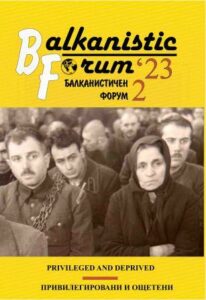
Abstract: The article examines the political subjects of social change during the Bulgarian tran-sition from totalitarianism to democracy (1990-2007): the subcultures of ‘former com-munists’ and of ‘anti-communists’ formed in the early 1990s. The research question is about their attitudes in the past and presence to lustration – a point of intersection for the ideology, ideologemes, political rhetoric and practice of the ‘left’ and ‘right’, and an example of the divergence of the social projects of the main political forces – the Bulgarian Socialist Party (BSP) and the Union of Democratic Forces (UDF). The re-search is based on a historical analysis of act and archival materials, periodicals, memoirs and surveys, as well as socio-anthropological analysis of in-depth interviews and focus groups..
Keywords: lustration; decommunization; post-communist transition. subcultures; Bulgaria subculture; transition; Bulgaria

Abstract: One of the most characteristic phenomena of the Transition in Bulgaria in the 1990s were the socalled Wrestlers’ brigades. Their emergence and rise left a lasting imprint on the social fabric and provided the initial impetus for the formation of the so-called ‘Wrestlers/ Mutri’ subculture. In a situation of rapidly changing public, economic and social environments in Bulgaria after the fall of the totalitarian regime in 1989, the Wrestlers’ brigades gave young men with modest family backgrounds the opportunity to become part of a set enjoying a progressively privileged economic and social circumstance. In the aftermath of the state’s abdication of its regulatory and adjudicative functions, these groups and their individual members gained access to various power levers and transformed from privileged to privileging — granting privileges — both to in-group members (family, friends, etc.) and outsiders such as politicians, business people, artists, etc. This process of transformation from disadvantaged to privileged in this context has not yet been fully explored. The available documentary and archival information is currently limited and difficult to access. Fiction as a parallel source allows us to consider these processes from a different angle. The purpose of the proposed paper is to analyse the novels of Georgi Stoev – admittedly a former member of a Wrestler’s group, as a source of information about the process of transformation from disadvantage to privilege and of specific subcultural traits. By comparing the information in the eight books in the ‘Witnesses of the Times’ and ‘BG Godfather’ series with publicly available documents, studies and publications, a deeper understanding is obtained of the values and dynamics of the Wrestlers/ Mutri subculture in Bulgaria at the end of the 20th and the beginning of the 21st century.
Keywords: wrestlers; mutri; subculture; transition; Bulgaria
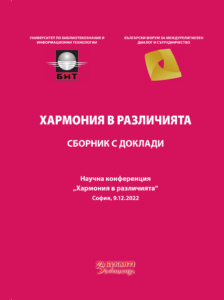
Abstract: This article presents results from the ninth wave of the European Social Survey (ESS), conducted in 2018. The emphasis is on the equality because this value orientation is the foundation of the democratic neoliberal ideology of modern European societies. Based on a quantitative secondary analysis of empirical data, it is established that Bulgaria holds one of the last places in terms of equality, along with some former socialist countries such as Hungary, Estonia, and Lithuania, that is probably due to the eroded during the so-called democratic transition totalitarian ideologems of equality and social justice. The comparative cross-cultural analysis of the data from the sixth (2012), seventh (2014), eighth (2016), and ninth wave (2018) of the ESS clearly shows a decrease in the intensity of equality by years among European countries. The study raises some questions about the crisis of European values through the prism of equality as a basic democratic value and ideology.
Keywords: equality, the European Social Survey, the Bulgarian case, cross-cultural analysis, value crisis.

Abstract: В студията се изследва преходът от тоталитаризъм към демокрация в България, като се фокусира върху отношението към комунистическите паметници на основните му действащи лица – старите и новите политически елити. За да се открои мястото на комунистическите паметници, които в периода на Прехода се оказват „трудно (материално и символно) наследство“ от тоталитарното минало, те се разглеждани не толкова като примери за пропагандно изкуство и архитектура, обслужващи тоталитарния режим или като места/пространства за ритуалите на преход на отделни социални групи, а са анализирани едновременно от две други и по-рядко използвани перспективи: паметниците като „места на памет“ и като обекти на културното наследство. Изследвана е работата на колективната и на историческата памет и се заключава, че през преходния период мнозинството от комунистическите паметници в София остават действащи места на памет и работят в полза на тоталитарното минало, без да ликвидират „трудното наследство“.
Keywords: преход, комунистически паметници, места на памет, субкултури
